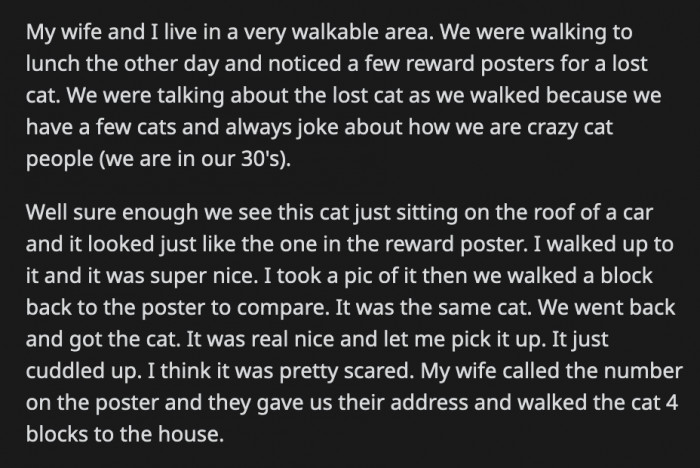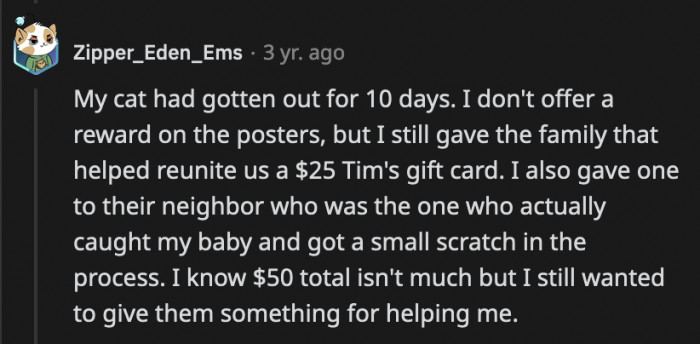Cat Owners Shame The Person Who Found Their Cat For Taking The $500 Reward They Promised In The Missing Cat Posters
I was recently approached while walking my dog by a group of kids handing out flyers for their missing cat. They said it was their grandma's cat that had wandered off after a door was mistakenly left ajar.
I promised to keep an eye out for it, but unfortunately, I haven't seen it anywhere in our area. OP and his wife faced a similar situation in their neighborhood.
They were discussing the missing cat posters they had seen while walking to get lunch. OP and his wife have a few cats of their own and regularly joke about being crazy cat people.
As luck would have it, they saw the cat from the posters lounging on the roof of a car. OP approached the cat, and it was friendly, so he took a picture and walked to check the reward poster from the block before.
They confirmed that it was the same cat and went back to pick it up. OP's wife then called the number on the poster and got in touch with the owners, who live four blocks from where they found it.
The kids who owned the cat ran out happily when they saw OP approaching their house with the missing cat. OP noticed that the mom was tearing up because of the joyous reunion.
As they were walking back to their house, OP mentioned the $500 reward that was promised and asked if it applied to the situation, but reassured them that it was fine if it didn't.

The dad looked at OP as if he had committed a sin, while the mom asked him if OP really wanted them to give him the reward.

OP replied that he wasn't trying to make the situation awkward, but he did find their cat, and they promised a reward for it.
The dad went inside and gave OP $320, saying it was the only cash he had on hand, but told OP he could e-transfer the rest if it was that big of a deal. They were talking loudly about how shameless OP was for taking the reward as they walked back to their house.

Understanding Attachment and Trust in Relationships
Dr. Linda Brooks, a developmental psychologist at Yale University, highlights that attachment styles significantly influence interpersonal trust and expectations.
Her research indicates that individuals with insecure attachment styles may react negatively to perceived betrayals, such as feeling shame over accepting rewards.
This emotional response often stems from a fear of being judged or misunderstood by others.
OP's wife is on his side, but their friends and family are divided on whether OP should have let the money go. Was OP really shameless for taking the reward money?

It's not like OP asked for money out of the blue — they promised a $500 reward to anyone who could return their cat, and that's exactly what OP did.

For a reward, $500 is a lot, but they did promise it.

According to studies in the Journal of Family Psychology, attachment theory underscores the importance of secure relationships for emotional health.
When individuals feel secure in their relationships, they are more likely to engage positively with others, including accepting help or rewards.
Conversely, insecure attachments can lead to conflict and misunderstanding in social situations.
They could have at least pretended to be nice to OP; he did find their missing cat for them.

They were wrong not to offer it immediately and made OP ask for the money.

They shamed him within earshot. Who does that to a person who just helped you?

The Psychology of Guilt and Shame
Psychologists emphasize that feelings of guilt and shame are deeply rooted in social contexts and expectations.
Research shows that these emotions can lead individuals to act defensively to maintain their self-image, often resulting in conflict.
Understanding these dynamics can help individuals navigate their feelings and responses in social interactions more effectively.
OP can ask for the rest of the money or take the cat back. However, doing the second one would definitely make OP the a**hole.

You can't walk back on a promised reward, and OP could have actually taken them to court if they denied him the $500.

That's worth at least two weeks of groceries, and nobody would turn that down.

Research published by the American Psychological Association suggests that addressing feelings of guilt and shame through self-compassion can enhance emotional well-being.
Practicing self-acceptance and recognizing the value of helping others can shift perspectives and reduce the emotional burden associated with these feelings.
Building emotional awareness can empower individuals to respond more positively in challenging situations.
People went out of their way to help you, and it's only right to thank them for the effort. It was their choice to offer a significant amount of money.

A law student explained the unilateral contract that was discussed by the other commenters.

Someone went against the grain and said they wouldn't take the money unless they personally paid for some of the animal's needs, but commenters were quick to defend why taking the promised money wasn't wrong either.

Practical Approaches to Cultivating Trust
To foster trust in relationships, experts recommend open communication about expectations and boundaries.
Engaging in discussions about feelings surrounding help and rewards can clarify misunderstandings and enhance relational dynamics.
Additionally, practicing gratitude for support received can strengthen bonds and promote a healthier emotional environment.
Not taking the money would have made OP a gallant and kind stranger who happened to find a beloved family cat. Asking for the reward wasn't wrong either — it's not like OP named his price and refused to release the cat unless they gave him cash.
It was awkward that OP even had to ask for the money in the first place. OP shouldn't lose sleep over this since he did the right thing and is now $320 richer.
Psychological Analysis
This situation highlights the intricate emotional dynamics at play when individuals navigate social expectations around help and rewards.
Understanding these feelings can empower individuals to engage more authentically in their relationships.
Analysis generated by AI
Analysis & Alternative Approaches
Understanding the emotional dynamics of guilt, shame, and attachment is crucial for navigating complex social interactions.
Research supports the idea that fostering secure attachments and open communication can significantly enhance relational satisfaction and trust.



